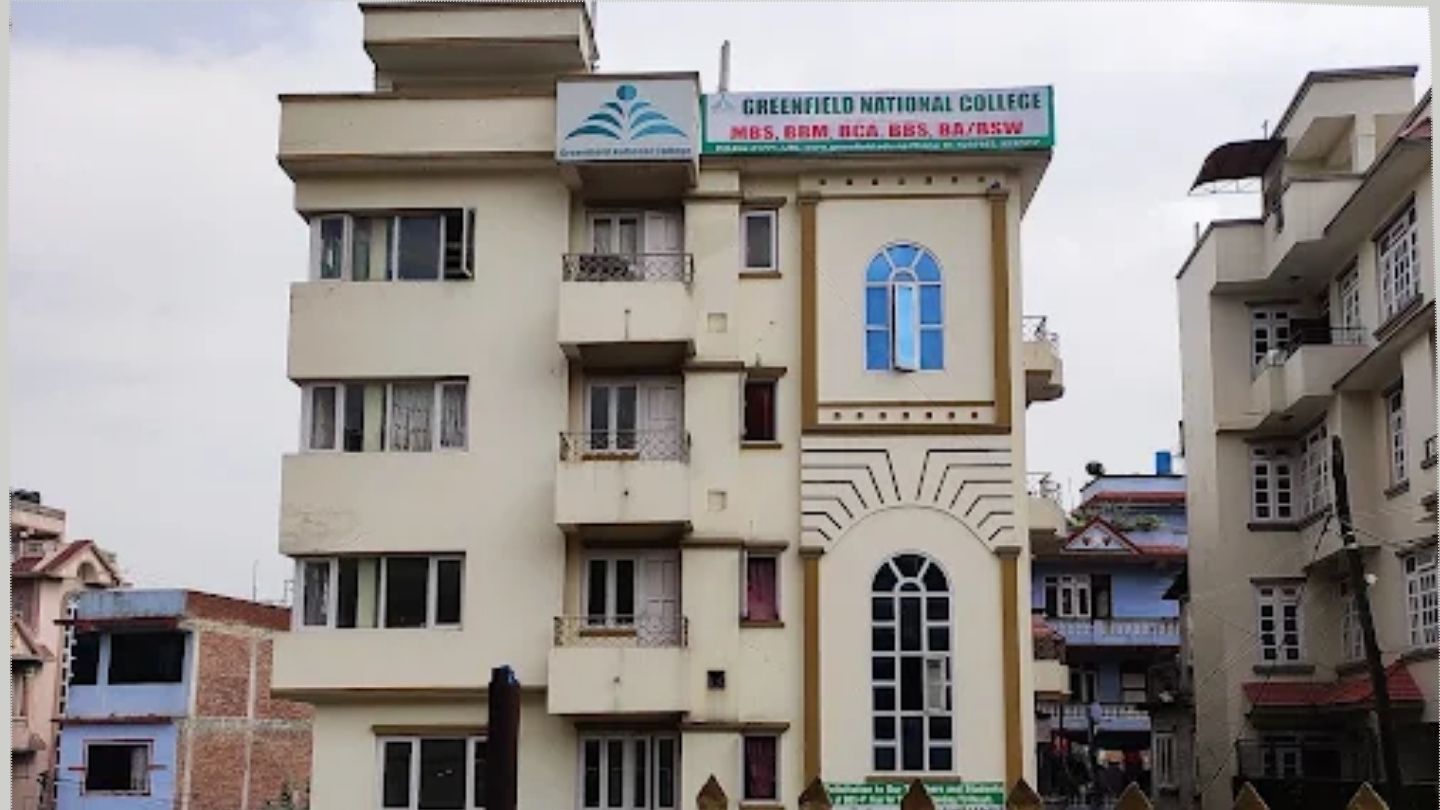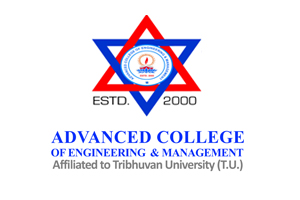Overview
Greenfield National College (GNC) in Bafal, Kathmandu, is an affiliated institution of Tribhuvan University (TU) and Rajarshi Janak University (RJU). Established in 2007, the college offers undergraduate and graduate programs in Management, Humanities/Social Work, and Information Technology.
GNC was founded with the idea that higher education should be useful, relevant, and rooted in real academic practice. The college runs programs under two Nepali universities—TU and RJU—so students can select a pathway that aligns with their interests in business and management, social work, or computing.
The GNC maintains a steady academic routine with classroom learning, internal assessments, project work, research exposure, and events that connect theory with practice. Facilities include a library, computer and logic labs, a journalism lab, sports spaces, and a rooftop cafeteria. Student clubs, workshops, talks, and field visits run throughout the year to support growth beyond the syllabus.

Quick Highlights
-
Established: 2007
-
Location: Bafal, Kathmandu
-
Affiliation: Tribhuvan University (TU) and Rajarshi Janak University (RJU)
-
Programs (Undergraduate): BBS, BBM, BASW, BCA (TU); BCA, BBA, BSc CSIT (RJU)
-
Programs (Graduate): MBS (TU), MBA (RJU)
-
Academic Culture: Classroom teaching, internal evaluation, projects, seminars, guest lectures, and field studies
-
Student Support: Scholarships on merit and need, provisions for students from underrepresented backgrounds, activity-based learning
-
Clubs: Theatre, Arts & Literature, Music, Sports; additional student-led initiatives
-
Facilities: Library, computer lab with internet, logic lab, journalism lab, sports courts, cafeteria, transportation
Academic Programs Offered
Undergraduate Programs (Rajarshi Janak University)
BSc in Computer Science and Information Technology (BSc CSIT)
A four-year program that covers core computing fundamentals along with practical lab work and project components. Students are expected to gain strong programming habits, problem-solving routines, and exposure to networks, databases, algorithms, and software development life cycles. The college aligns routine labs, assignments, and internal assessments with the university syllabus to keep students on track for semester evaluations.
-
Duration: 4 years (8 semesters)
-
Seats: 40
-
Typical Background: Science at +2 or equivalent as per RJU rules (mathematics is expected)
-
Learning Mode: Lectures, labs, projects, internal tests, presentations, and industry exposure through talks or visits
-
Progression: Entry-level roles in software, QA, network support, database support, web/app development; further study options in computing and data-related fields
Bachelor of Business Administration (BBA)
BBA focuses on foundational business knowledge with an emphasis on accounting, finance, marketing, operations, and organizational studies. Classroom delivery is reinforced through presentations, group tasks, case readings, and small research assignments.
-
Duration: 4 years (8 semesters)
-
Seats: 40
-
Eligibility: +2 or equivalent in any stream as per RJU criteria
-
Learning Mode: Lectures, internal assessments, practical assignments, guest sessions
-
Progression: Entry-level roles in administration, sales/marketing support, finance support, operations; options for MBA and professional certifications
Bachelor of Computer Application (BCA)
BCA is designed for students interested in applied computing. The course covers programming, web technologies, databases, and basic networking with regular lab practice.
-
Duration: 4 years (8 semesters)
-
Seats: 40
-
Eligibility: +2 or equivalent as per RJU rules (mathematics may be required/recommended per university policy)
-
Learning Mode: Lectures, labs, internal tests, project work
-
Progression: Web/app developer trainee, technical support roles, QA support; options for advanced study in IT
Undergraduate Programs (Tribhuvan University)
Bachelor of Business Studies (BBS)
BBS offers a wide base in accounting, finance, economics, and management. The college runs classroom lectures alongside assignments and periodic internal exams.
-
Duration: 4 years
-
Seats: 50
-
Eligibility: +2 or equivalent with minimum second division; for humanities background, English (100 marks) and Mathematics (100 marks) at higher secondary level are expected for BBS entry
-
Learning Mode: Lectures, presentations, internal assessments
-
Progression: Accounts assistant, admin roles, banking support roles; route to MBS and other postgraduate options
Bachelor of Business Management (BBM)
BBM concentrates on managerial fundamentals with courses in leadership, entrepreneurship basics, and functional areas of business.
-
Duration: 4 years (8 semesters)
-
Seats: 35
-
Eligibility: +2 or equivalent as per TU rules
-
Learning Mode: Lectures, case discussions, group work, internal tests
-
Progression: Assistant roles in HR, admin, sales/marketing, operations; higher study paths in management
Bachelor of Arts in Social Work (BASW)
BASW builds core social work knowledge with courses in social policy, community engagement, and research basics. Field visits and supervised tasks help students link theory to community contexts.
-
Duration: 4 years
-
Seats: 40
-
Eligibility: +2 or equivalent as per TU rules
-
Learning Mode: Classroom learning, fieldwork, presentations, small research tasks
-
Progression: NGO/INGO assistant roles, community support roles, program facilitation; options for MSW and related postgraduate study
Bachelor of Computer Application (BCA)
TU’s BCA covers programming, data structures, web technologies, and database practice with steady lab routines.
-
Duration: 4 years (8 semesters)
-
Seats: 35
-
Eligibility: +2 or equivalent as per TU rules (mathematics requirements per university policy)
-
Learning Mode: Lectures, labs, internal tests, project work
-
Progression: Entry-level developer roles, IT support, testing; pathway to master’s-level computing
Graduate Programs
Master of Business Studies (MBS) — Tribhuvan University
MBS strengthens knowledge in accounting, finance, marketing, and research methods. Students complete coursework and internal evaluations aligned with TU guidelines.
-
Duration: 2 years
-
Seats: 50
-
Eligibility: Bachelor’s degree in BBS or any recognized bachelor’s degree accepted by TU for MBS entry
-
Learning Mode: Lectures, presentations, report writing, internal testing
-
Progression: Mid-level roles in accounts/finance/admin over time; stepping stone to MPhil/PhD for interested candidates
Master of Business Administration (MBA) — Rajarshi Janak University
RJU’s MBA is a semester-based program focusing on managerial decision-making, functional integration, and applied projects (as per university curriculum).
-
Duration: Typically 2 years (semester system)
-
Seats: 40
-
Eligibility: Bachelor’s degree in any stream meeting RJU’s minimum grade/percentage requirement
-
Learning Mode: Lectures, case readings, presentations, group assignments, practical tasks
-
Progression: Supervisory and junior managerial tracks across sectors; preparation for higher responsibilities with experience
Admission Process
The college follows university rules for entry. Key steps are listed below to help plan on time:
-
Eligibility Check
-
Undergraduate (TU): +2 or equivalent; for BBS, applicants from humanities should have English (100 marks) and Mathematics (100 marks) at higher secondary level.
-
Undergraduate (RJU): +2 or equivalent as per RJU rules; BSc CSIT typically expects science background with mathematics.
-
Graduate (MBS—TU): Bachelor’s degree in BBS or any recognized bachelor’s degree accepted by TU.
-
Graduate (MBA—RJU): Bachelor’s degree in any stream meeting RJU’s minimum requirements.
-
-
Application Form
-
Where: College admission office (or as instructed on notices).
-
What to Attach: Academic transcripts, character certificate, citizenship/ID, recent photos, and any category documents for scholarships.
-
-
Entrance/Screening
-
Depending on the program, an entrance test and/or interview may apply as per TU/RJU rules.
-
Minimum pass criteria and merit ranking guide the selection list.
-
-
Merit List and Offer
-
The college publishes the list of selected candidates following the university-prescribed process.
-
-
Admission Confirmation
-
Pay the notified fees within the stated window and complete registration as per instructions.
-
-
Academic Calendar
-
Follow the schedule for orientation, class start dates, and internal assessment timelines.
-
Teaching Faculty and Learning Methodology
GNC brings together senior professors and young lecturers with a shared focus on academic continuity. Teaching plans are arranged semester-wise or year-wise, depending on the program, and emphasize:
-
Regular Classes: Timetabled lectures that follow the official syllabus.
-
Internal Evaluation: Class tests, assignments, and presentations to maintain study discipline.
-
Project/Field Components: Hands-on work, field observations (where relevant), and basic research tasks.
-
Talks and Workshops: Sessions with invited speakers help students hear from practitioners and researchers.
-
Feedback Loops: Instructors review internal assessment results and guide students on areas that need improvement.
Infrastructure and Learning Facilities
-
Library: Textbooks, references, journals, and daily newspapers for coursework and current affairs.
-
Computer & Logic Labs: Routine lab hours for BCA/CSIT and related tasks; internet facilities on campus.
-
Journalism Lab: Space and equipment to support communication-related learning needs.
-
Classrooms: Spacious rooms arranged for group work and presentations.
-
Sports: Basketball, football, cricket, table tennis, badminton; inter-college participation when scheduled.
-
Cafeteria: Rooftop setting with broad views of Kathmandu; standard snacks and meal options.
-
Transport: College transportation on select routes as notified each session.
-
Research Wing: An internal unit that facilitates small-scale studies and supports students, faculty, and independent researchers seeking guidance.
Student Life and Campus Experience
Student life at GNC is active during the academic year. Clubs and committees coordinate events across arts, literature, performance, and sports. Internal presentations and group work cultivate public speaking and teamwork. Educational tours, field visits, and annual gatherings encourage peer bonding and exposure beyond textbooks.
Students also engage in small research tasks, surveys, or report writing under instructor supervision. The student experience aims to balance academic obligations with community engagement and practical exposure.
Extracurricular Activities (ECA)
-
Student Clubs: Theatre, Arts & Literature, Music, and Sports run events and workshops.
-
Talks & Seminars: Topic-focused sessions led by faculty, alumni, or invited guests.
-
Field Visits: Course-relevant visits to organizations, institutions, or project sites.
-
Competitions: Inter-college and intra-college events in sports, arts, and public speaking.
-
Annual Functions: Cultural programs and recognition events based on the academic calendar.
Scholarships and Financial Support
GNC announces scholarship opportunities each year in line with university rules and internal policy. The following categories are typically available:
-
Merit-Based:
-
Board/Entrance Toppers: Full or partial tuition support may apply.
-
Greenfield Scholarships for Young Talents and Diligent Students: Performance-linked support.
-
-
Inclusive Provisions:
-
Differently Abled Students
-
Students from Underprivileged and Marginalized Communities
-
Students from Remote Areas
-
-
Activity-Based:
-
Students with consistent achievements in sports, arts, music, or literature may be considered.
-
-
Need-Based:
-
Applicants with financial constraints can request support as per announced criteria.
-
Achievements and Institutional Milestones
-
Year of Establishment: 2007
-
Dual Affiliation: TU and RJU programs under one campus.
-
Research Wing: An internal unit that encourages academic curiosity and supports basic research activity.
-
Student Clubs: Year-round activities across theatre, arts & literature, music, and sports.
-
School Linkage: Academic linkage with Greenfield National School (founded in 1998), enabling shared educational insights across school and college levels.
Why Choose This Institution?
Students often weigh multiple factors before committing to a program. GNC’s profile indicates:
-
Dual University Pathways: TU and RJU offerings on the same campus broaden course choices.
-
Range of Disciplines: Business, social work, and computing under one roof.
-
Activity-Rich Culture: Clubs, field visits, and workshops add practical exposure to classroom study.
-
Scholarship Windows: Merit, need, and inclusion-based options help eligible students manage costs.
-
Accessible Location: Bafal, Kathmandu, with transport options announced per session.
-
Research Orientation: An internal research wing supports small-scale studies and nurtures inquiry habits.
These points help build a clear picture for students who want dependable routines, recognized degrees, and steady support mechanisms.
Conclusion
Greenfield National College presents a structured academic environment with programs affiliated to Tribhuvan University and Rajarshi Janak University. The campus combines classroom learning with clubs, field visits, research support, and periodic events that add context to formal study. Scholarships and inclusion provisions encourage wider participation.
FAQ
1) Which universities is GNC affiliated with?
GNC runs programs under Tribhuvan University and Rajarshi Janak University.
2) What undergraduate programs are available?
BBS, BBM, BASW, BCA (TU), and BSc CSIT, BBA, BCA (RJU). Seat numbers vary by session and approval.
3) What postgraduate programs are offered?
MBS (TU) and MBA (RJU).
4) How many seats are available in key programs?
Indicative seats include BSc CSIT (40), BBA (40), BCA-RJU (40), BBS (50), BASW (40), BBM (35), BCA-TU (35), MBS (50), MBA (40). Final seats are as per the university.



















You need to login to comment.